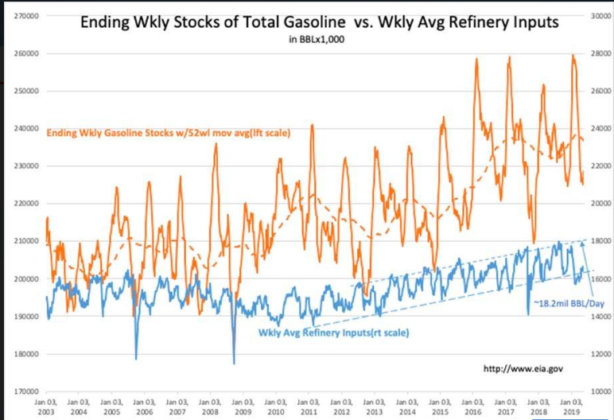I continue to think the risk for a major move in oil is higher….much higher.
“Davidson” submits:
I continue to watch this play out:
Exxon’s Bayside refinery has been delayed coming back on line and other refineries are off line for upgrades. US Crude Inv rises again as refining remains quite low for this time of year.
Traders who watch US Crude Inv see a rise and oil prices see some downward pressure. Exxon is expected to come back on line in June, but no date provided.
The WSJ has a good piece on oil today:
Oil is still a global commodity, though. The U.S. may be headed toward becoming a net exporter of crude, but that is still less than 15% of global supply. A sudden cutoff, even for barrels not headed for our shores, increases prices for everyone.
By the 1980s, motorists were conditioned to groan when they saw a scary headline from the Middle East.
Recently there has been a confluence of events that should at least make us nervous. In just the past several days, at least four oil tankers suffered mysterious attacks near the Strait of Hormuz, a key chokepoint for seaborne oil transport. About a fifth of global production passes through the waterway.
One alternative Saudi Arabia has is to ship crude to the Red Sea through pipelines, but a critical pumping station was hit by a drone attack that Saudi Arabia blamed on Houthi rebels from Yemen supported by regional arch-rival Iran. Last year Saudi Arabia curtailed shipments through another waterway, the Bab al-Mandeb or “gate of tears,” after attacks it also blamed on Houthis.
Meanwhile Iran, still a major exporter whose shipments President Trump would like to see squeezed to zero, is itself a flash point. The U.S. has sent vessels to the area and evacuated personnel from neighboring Iraq as talk of military action has come from both sides. U.S. oil giant Exxon Mobil recently evacuated international staff from a field in Iraq as well.
Russia, while not facing a violent threat to its prolific oil production, has an equally thorny problem. Exports through a major pipeline to Europe have been halted due to mysterious chemical contamination, making physical barrels scarce in Europe. The situation could continue for months.
Finally, once-major exporter Venezuela continues to be a basket case. In April, oil production fell to the lowest level since 2003 when they were nearly halted by a coup against former President Hugo Chávez. An abortive coup against his successor weeks ago caused barely a ripple in oil prices.
“Taken en masse, they are a symptom of an increasingly unstable setting at a time when spare oil production capacity in and outside OPEC is quite limited,” wrote energy expert Amy M. Jaffe of the Council on Foreign Relations.
After years of oil traders crying wolf at such headlines, their ability to move the crude market has faded. There is plenty of oil in storage and coming out of fields under no threat of violence. But that stored crude and those fields won’t be nearly enough if something really goes wrong.
To access premium content FREE for 5 days, please follow this link
